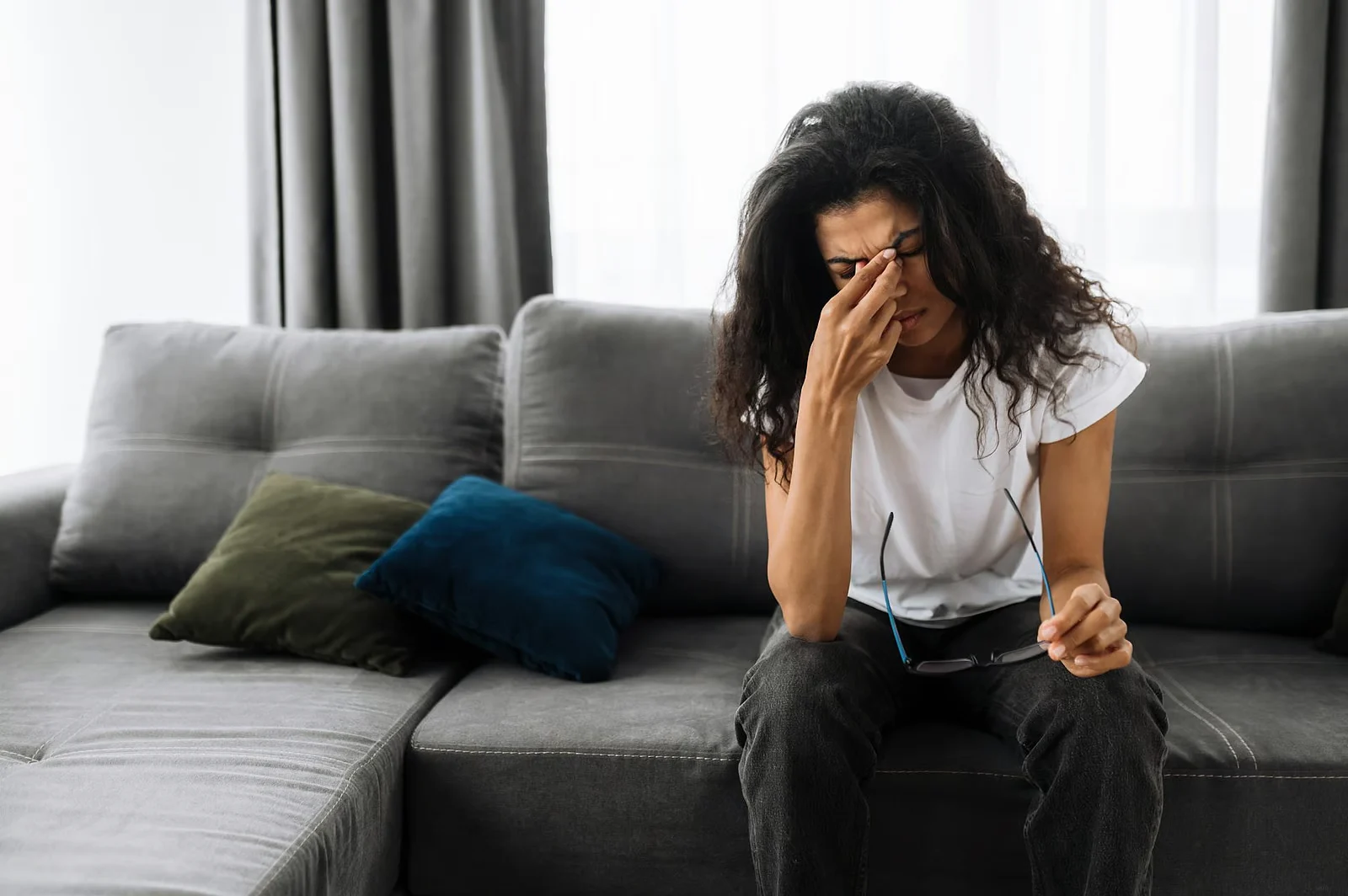Understanding Perimenopause Headaches: Causes, Symptoms & Management

Changing hormones during perimenopause can cause headaches. These headaches can be mild to unbearable. There are many reasons why a person could have headaches, including excessive screentime and eating certain foods or stress. However, for women in their late 30s or 50s if you cannot get rid of your headache and with it you’ve noticed irregular periods then you could be suffering from perimenopause headaches.
Does Perimenopause Cause Headaches?
If you have suffered from headaches while on your period or after stopping birth control then chances are you will suffer during perimenopause headaches as well. These constant headaches during perimenopause are linked to hormones. Read on to learn more on the matter:
Fluctuating Hormone Levels: An ardent contributor to perimenopause headaches is the fluctuating hormones in your body. Menopause brings with it fluctuating hormones. Although headaches can strike you at different stages of your life, you are more susceptible to them in the years leading up to menopause. This period signifies the end of your reproductive years.
Increased Sensitivity to Stress: Stress can have an impact on the human body when you are going through perimenopause symptoms. You must exercise regularly, eat a healthy diet and avoid skipping meals to keep stress at bay. You may also resort to using relaxation techniques to help you lighten your load and be stress-free. Exercises such as yoga or simply walking can elevate your mood and considerably reduce your stress.
Sleep Disturbances: It is highly imperative that you get a good amount of sleep to avoid headaches during perimenopause. Women suffer from hot flashes during this time, which may cause you to wake up at night and disrupt your sleep. Not getting adequate sleep can cause headaches during perimenopause.
Other symptoms: Symptoms such as shortness of breath, a fever, a rash or a stiff neck are also symptoms you should be alert about.
How to Manage Perimenopausal Headaches?
If you are knee-deep in headaches, which are a perimenopause symptom, and don’t know what to do about it, continue reading to learn about how you can manage it:
Maintain a Consistent Sleep Schedule: Ensure you have a consistent bedtime routine to make sure you get an adequate amount of sleep. Avoid caffeine, alcohol and spicy food in the evenings as it might keep you up.
Stress Management: Engaging in stress-reducing activities such as yoga, meditation, or deep-breathing exercises can significantly help reduce tension headaches. Identifying personal stressors and addressing them proactively can prevent headaches from becoming a daily occurrence.
Hydration: It is important to drink plenty of water during perimenopause. Changing oestrogen levels can have an effect on how thirsty you feel. Drinking less water can cause dehydration, which can directly impact your headaches. Do not make the mistake of substituting coffee for water as caffeine can trigger migraines for some people. Also, if you are cutting caffeine from your diet do not go cold turkey instead gently wean yourself from it. According to research conducted by the National Library of Medicine, people who suffer from headaches should limit themselves to two cups of coffee per day.

Exercise Regularly: Getting regular physical exercise can help with perimenopause symptoms. You can choose any kind of exercise that you find comfortable, ranging from running or cycling. If you are not an outdoors person you can choose going to a gym. If all else doesn’t float your boat, then simply walking should suffice as exercise.
Hormone therapy: s Hormonal changes are natural with perimenopause. Do consult your doctor and enquire about hormone therapy to see if it may help you. Hormone therapy has pros and cons so consulting a doctor is important to make an informed decision.
When to See a Doctor?

Although there are many ways in which you may be able to manage perimenopausal headaches with lifestyle adjustment, there are times when you will need to visit a doctor:
- Persistent or Worsening Symptoms: If the perimenopausal headache is persistent then you must speak to a doctor. Another symptom of perimenopause is light spotting. For that you can choose from a range of Always panty liners for comfort and protection. The Always Flexistyle Panty Liners are dermatologically tested to be gentle on your skin and their thin breathable design is sure to give you the protection you need.
- Severe Pain Unresponsive to Treatment: If over-the-counter medication brings you no respite, then a doctor consultation is needed. These headaches can affect your day-to-day life and are best if treated immediately. Coupled with perimenopause, headaches can be a challenging affair, so it is essential that you equip yourself with the right information and management methods to navigate it well. Basics like a healthy diet, good hydration and exercise are important to manage perimenopause headaches. Lastly, always seek medical help instead of treating yourself if you feel your situation is severe.
Perimenopausal headaches sure are a menace but they need not be feared. Instead, an immediate diagnosis is encouraged and adequate treatment should be availed.
Disclaimer
Please note the date of the last review or update on all articles. No content on this site, regardless of date, should ever be used as a substitute for direct medical advice, diagnosis or treatment from your doctor or other qualified clinician. Always is committed to ensuring that all of our products meet rigorous safety standards; Always pads prioritize safety, protection and comfort of its consumers.




